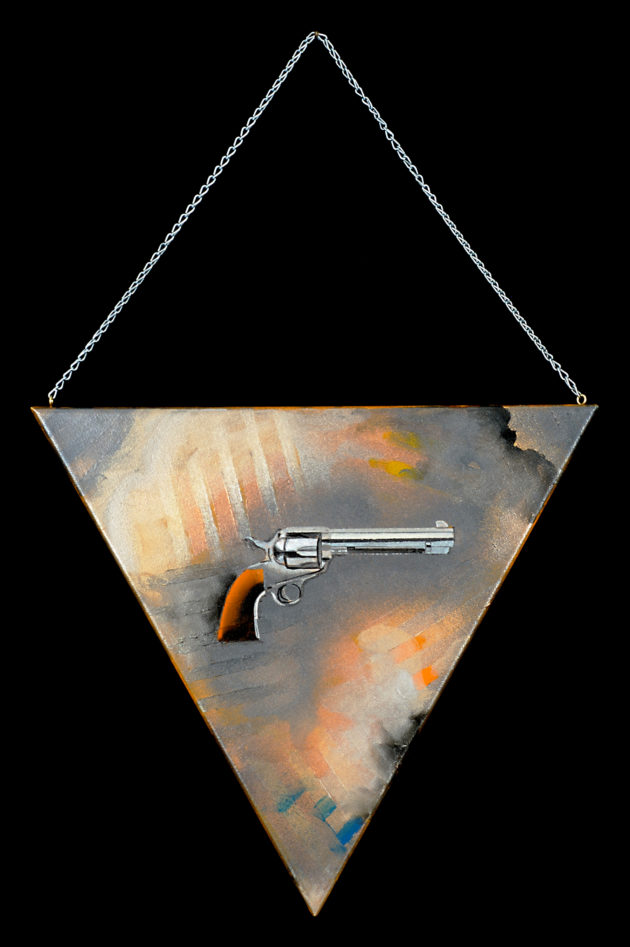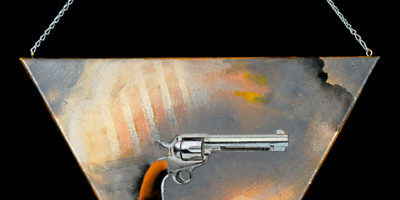Lilith Feature
Our Violent Children

“The Kabbalah of Bling,”
Yona Verwer, www.yonaverwer.com
When Adam Lanza murdered 20 schoolchildren and 6 adults in Newtown, Connecticut — including himself and his own mother — parents everywhere hearing the news tried to imagine how they could keep their own children safe if there were a “next time.” But some parents had another, deeper fear as well: the fear that a child of theirs might be the potential perpetrator of such a violent act.
“I love my son. But he terrifies me,” wrote Liza Long, in “I Am Adam Lanza’s Mother,” her haunting account of parenting a violence-prone child. Her piece went viral on the Internet. It turns out there are many parents able to imagine a child who, like Long’s son, phones from an inpatient psychiatric unit saying, “I hate you. And I’m going to get my revenge as soon as I get out of here.” And many of the same parents could also imagine getting the call she received from her hospitalized son three days later, when “he was my calm, sweet boy again, all apologies and promises to get better.”
The parents of violent children have much anguish and few resources. Liza Long practically sobs it out: “No one wants to send a 13-year-old genius who loves Harry Potter and his snuggle animal collection to jail. But our society, with its stigma on mental illness and its broken healthcare system, does not provide us with other options. It’s time for a meaningful, nation-wide conversation about mental health.” In the Jewish community this conversation has been stalled in part by parental shame, guilt and a sense of alienation from others who all appear to have “perfect” children. But some parents have found Jewish resources as they frantically try to understand and protect their loved but frightening boys.
Interestingly, no aggressive daughters surfaced in this admittedly limited sample of parents willing to speak — most anonymously — about their families. Perhaps, as research shows, females tend to turn their rage inward, with self-harming behaviors like cutting. Here, five brave Jewish mothers of violent sons speak out, not selflessly but as part of a bargain — their stories for your open ears.
Ilana Kramer is a writer and clinical psychologist who specializes in trauma. She lives in Brooklyn.
“He’d ask us to lock him in his room so he wouldn’t hurt anyone.”
Lucy Pritzker
My son always needed a lot of attention as a baby. He had separation anxiety earlier than most kids, and it never went away. He couldn’t sleep by himself. He couldn’t take no for an answer. He would perseverate; if there was something he wanted, he couldn’t move on. He didn’t make friends. If he saw a group of kids playing with a toy, he’d run over and steal it or kick them, instead of asking to join in. He hated transitions, and any change in routine. He held it together in school but would save it for us at home. The minute I’d pick him up, he’d be screaming, biting, cursing, pulling my hair. There would be physical tantrums for the whole rest of the afternoon. When my son was in first grade, we went to Jewish Family Services. They told us it was family dynamics, behavioral issues, and parenting issues, but no one could explain why he had this moodiness.
The summer after my son finished third grade in Scotch Plains, New Jersey, things got really, really bad. He was fascinated by the knives in our home and threatened to use them. We locked them up. He would beg us to hold him so he wouldn’t hurt himself. He would poke himself with sharp objects or ask us to lock him in his room so he wouldn’t hurt anyone else. There were a number of weeks we were restraining him for so long that we just couldn’t keep up with it. We were held hostage by his behaviors. He’s a good, good boy, and he didn’t want to live like that either.
That summer I made the hardest decision I ever had to make. Our family couldn’t maintain itself, our other kids had to stay with our parents. So that’s when we hospitalized him. Which did nothing. It took him out of our home, so we were safer, but he was in a psychiatric hospital, and his issues were seen as behavioral. One doctor said to him, “Where did you get the idea that acting this way gets you what want?” And he said, “I’m not doing it to get what I want.” After 10 days in the hospital, he came out with the same symptoms, so he himself asked to go back in. I started to focus on finding alternatives to hospitals, because the hospitalizations were more traumatic than the behaviors. We ended up in a residential treatment center in Texas, the first place that saw this as a neurobehavioral issue, rather than a parenting issue. When he began unraveling again at home, we started thinking that he’s is a kid who’s able to maintain himself in a structured environment that even the best parent can’t provide. We took him off his medication the summer he was 10. People disagreed. Psychiatrists disagreed. But even though he was still irritable, moody, and oppositional, he didn’t rage anymore.
We enrolled him in a private school, the Hampshire Country School, in New Hampshire, for gifted boys who can’t maintain themselves in a traditional school setting. He gets a lot of adult attention and structure — small dorms, four or five boys with a dorm parent. It’s not a therapeutic boarding school, but it is a boarding school that’s therapeutic. My son is 13 now, and six of the 20 kids in his school are Jewish. Jewishness is always part of who he is; he loves tradition because he loves the laws and what he can and cannot eat. (He sometimes keeps kosher at school, and other times is too hungry, he says.) One of the staff members helps him study for 10 minutes a day for his parsha. There’s a tutor who comes to the school to teach him for his bar mitzvah in 2 months, on the campus. It’s going to be me, my husband, grandparents, aunts, uncles, cousins and staff.
We were Conservative, but belong to a Reform synagogue now. Our Temple Sholom of Fanwood, New Jersey, was very open about what they could do to help us. When the rabbi and his son came to our home with a freshly baked challah, it was so nice. I remember my son holding the warm challah. We would get phone calls from Jewish families, people calling, saying “I have a brother like this.” People did offer help and came forward. I made a point of speaking out in my temple community and beyond. That’s what kept us going. My first instinct was to feel shame, but I couldn’t let that happen, because I knew it wasn’t a shameful thing. There are kids whose needs can’t be met by local services. One thing we had to come to grips with was that we couldn’t provide it within our family. I think our mental health system is about family preservation, keeping kids at home and delivering services there. But for us, family preservation was about having his needs met outside the home to preserve our family. I was so afraid he wouldn’t be close to his siblings, but the opposite is true. We’re closer. We’ve preserved the relationship.
“He got the message that if you exhibit violence, you’re in trouble.”
Marjory Newman*
If anyone can benefit from our suffering, I am willing to share our experience.
My father was mentally ill, and when my mother wanted to leave him, her family’s response was, “It would be a shanda — a shame — in front of the goyim.” I understood as a little girl that if I went forward and spoke about being sexually abused by my father I would be judged badly as the daughter of such a man. I understood this hierarchy of the Jewish community. As a child, I was very involved. I belonged to a Conservative shul, and derived a lot of strength from this, but not because I brought my problems there. There’s a difference between deriving benefit and seeking help.
My own son became a lightning rod for a dysfunctional family. He was highly irritable and cried for the first nine months, and I was an overwhelmed mother, so that’s how my relationship first formed. I had periods of bonding, and loving times, but his temper tantrums began at age four. I never adequately dealt with the abuse by my father, so it was difficult when rage was directed at me by my own child. My interior experience was that of a frightened little girl, not a mother who knew how to handle him.
My son had learning disabilities, and as he got older, the violence got worse. By 15, he was out of control with a mood disorder, attentional disorder, and oppositional defiant disorder. Part of it was we didn’t set proper boundaries; he refused medication, and we did not take steps where he would have been required to take it. It was also the mental health system, his biochemistry, and us not knowing how to handle the stresses of a mood disorder and a learning disability. He has no doubt that I loved him, but I was a flawed mother.
* Names with an asterisk are pseudonyms.


